|
|
|
Sort Order |
|
|
|
Items / Page
|
|
|
|
|
|
|
| Srl | Item |
| 1 |
ID:
112437
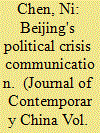

|
|
|
|
|
| Publication |
2012.
|
| Summary/Abstract |
This article explores how the Chinese government managed the 2009 Xinjiang riot through communications. To reconcile Western crisis communication concepts with the Chinese case, this study examines the government communications via news conferences during the riot. It finds that government communication functions only at operational and tactical levels but fails to play a strategic role in crisis management. This is so partly because government public relations have not yet been fully institutionalized. It also notes the differences between the government's handling of a political crisis (the Xinjiang riot) and of a natural disaster (the Sichuan earthquake).
|
|
|
|
|
|
|
|
|
|
|
|
|
|
|
|
| 2 |
ID:
129259
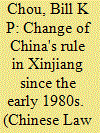

|
|
|
|
|
| Publication |
2012.
|
| Summary/Abstract |
During the reform era, the Chinese government's policies in Xinjiang have changed from accommodating to hardening. The alienation of ethnic minorities caused by the Cultural Revolution necessitated loosening of controls on cultural and religious freedom. With increasing incidents of disturbance leading up to the late 1980s, however, the Chinese government became more coercive on internal security and more generous with economic and development assistance. The global war against Islamic terrorism allowed China to justify a crackdown on the re-sistance in Xinjiang. The 2009 Ürümqi riot proved that the government's policies had failed to stabilize the region, but the Chinese government's countermeasure was to step up, not drop, the repressive policies
|
|
|
|
|
|
|
|
|
|
|
|
|
|
|
|
| 3 |
ID:
043561


|
|
|
|
|
| Publication |
Chicago, New American Library, 1962.
|
| Description |
253p.pbk
|
| Series |
Mentor Book
|
|
|
|
|
|
|
|
|
|
|
|
Copies: C:1/I:0,R:0,Q:0
Circulation
| Accession# | Call# | Current Location | Status | Policy | Location |
| 014158 | 951/CHA 014158 | Main | On Shelf | General | |
|
|
|
|
| 4 |
ID:
066235
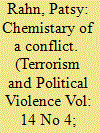

|
|
|
| 5 |
ID:
123984
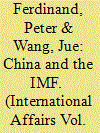

|
|
|
|
|
| Publication |
2013.
|
| Summary/Abstract |
The International Monetary Fund was the international financial institution that was most alien to the Chinese government when it embarked upon its economic reforms at the end of the 1970s, because financial markets were neglected in China's centralized plan. Therefore, China's increasing cooperation with the IMF illuminates the extent to which China has changed through 'socialization' into the norms of global governance more generally.
The article examines the evolution of China's involvement with the IMF and argues that in many respects it has embraced those norms. Even though its political economy still substantially diverges from western prescriptions, many features are compatible with the (original) 'Washington Consensus'.
But China remains wary of becoming too dependent on possible IMF assistance; it tries to preserve its freedom of manoeuvre. Although the IMF has attempted to acknowledge China's growing global importance by increasing its voting rights, this has failed to keep pace with change in the global economy. China is thus attracted by the possibility of additional ways of pragmatically increasing its leverage over global decisions, for instance through regional financial cooperation in Asia.
|
|
|
|
|
|
|
|
|
|
|
|
|
|
|
|
| 6 |
ID:
191874
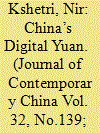

|
|
|
|
|
| Summary/Abstract |
This article highlights the key motivations behind China’s plan to launch the digital yuan and reviews the potential impacts on China and abroad. The article analyzes the digital yuan’s benefits to consumers, such as a reliable low-risk, low cost, and high-efficiency payment solution and the potential to promote financial inclusion. It compares the digital yuan with its most prominent competitors. Also discussed is how the digital yuan is expected to provide the Chinese Communist Party with a new powerful tool to monitor and control its economy and people. The article provides a critical evaluation of the potential of the digital yuan’s internationalization. This article also provides a perspective on the digital yuan to set global standards for the development of national digital currencies.
|
|
|
|
|
|
|
|
|
|
|
|
|
|
|
|
| 7 |
ID:
170797
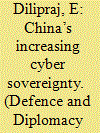

|
|
|
| 8 |
ID:
126781
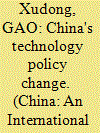

|
|
|
|
|
| Publication |
2013.
|
| Summary/Abstract |
The Chinese central govemment held the 4th National Conference on Science and Technology on 9 January 2006. At this important meeting. President Hu jintao and Premier Wen Jiabao made their speeches and announced the decision to develop China into an innovative country. On the same day. the State Council announced and issued the "National Guideline on Medium and Long-term Program for Science and Tech-
nology Development (2006-2020)'. According to the Guideline. by 2020. China': entire investment in resarch and development (R&D) is expected to ruch 2.5 per cent of the country's gross domestic product. while science and technology will contribute to about 60 per cent of the country's economic development.'
|
|
|
|
|
|
|
|
|
|
|
|
|
|
|
|
| 9 |
ID:
124278
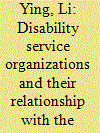

|
|
|
|
|
| Publication |
2013.
|
| Summary/Abstract |
The capacity of the Chinese government to provide adequate public services is constrained. Social service organizations have been founded to fill the gap. The chinese government reformed its policies in 2007 to more effectively use social organizations to meet people's needs and stengthen its management to avoid social disorder. The decentralized governance system assigned local government units to develop specific policies to fulfill this goal. To provide updated information on social service organizations and their relationship with the government in this new context, this study investigates four disability service organizations with a focus on Beijing. It is found that grassroots service organizations exhibit fairly strong autonomy and viability in the development process. However, these organizations have an ambivalent potential to contribute to the development of civil societyin the future. Both facilitating and constraining factors are identified in this study. Moreover, policy changes alter the relationship between the government and social service organizations. This study argues that a state-led partnership has emerged between the state and the grassroots service organizations in China. The future development of this embryonic partnership depends on the degreeto which the government relies on grassroots
|
|
|
|
|
|
|
|
|
|
|
|
|
|
|
|
| 10 |
ID:
170911
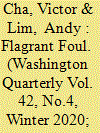

|
|
|
| 11 |
ID:
110240
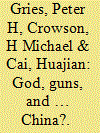

|
|
|
|
|
| Publication |
2012.
|
| Summary/Abstract |
What impact does ideology have on American attitudes and policy preferences toward China? Based on two large N surveys, we first utilize exploratory factor analysis to uncover six distinct American ideological dimensions and two distinct dimensions of attitudes toward China that distinguish between its government and its people. We then utilize structural equation modeling to explore how attitudes toward the Chinese people (i.e. prejudice) and attitudes toward the Chinese government differentially mediate relationships between ideological beliefs, on the one hand, and Americans' China policy preferences, on the other. Results suggest both direct and indirect effects of ideology on policy preferences, with the latter effects being differentially mediated by prejudice and attitudes toward the Chinese government.
|
|
|
|
|
|
|
|
|
|
|
|
|
|
|
|
| 12 |
ID:
129232
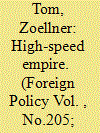

|
|
|
|
|
| Publication |
2014.
|
| Summary/Abstract |
Chinese rail is sprawling, modern, and elegant. It's also convoluted, corroding, and financially alarming. Wanna take a ride? THE BULLET TRAIN hurtles toward the industrial city of Taiyuan in northern China, and seemingly within seconds, the modern, smog-soaked Beijing skyline gives way to open fields. David Su is munching on pistachios in the bar car, careful that not a crumb hits his blue foulard scarf, as he heads some 320 miles to reach his early-morning appointment for a private equity firm. Over his shoulder, the Chinese countryside is a disembodied blur: farms and factories receding at the mind-aching speed of 186 miles per hour. Cars on a nearby highway seem to be creeping along by comparison. Su travels frequently for his job at Global Capital Investments Group, and he likes this new high-speed train, zipping along on one of several dozen lines built by the Chinese government in a decade-long blitzkrieg program that now has a price tag of $500 billion.
|
|
|
|
|
|
|
|
|
|
|
|
|
|
|
|
| 13 |
ID:
132993
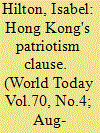

|
|
|
|
|
| Publication |
2014.
|
| Summary/Abstract |
It is the first such paper the Chinese government has produced since the 1997 handover, and its critics see it as a unilateral re-framing by China of the concept of One Country, Two systems, the late Deng Xiaoping's formula for the co-existence of Hong Kong's capitalism with Beijing's socialism with Chinese characteristics.
|
|
|
|
|
|
|
|
|
|
|
|
|
|
|
|
| 14 |
ID:
163764
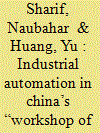

|
|
|
|
|
| Summary/Abstract |
The Chinese government has announced major plans to provide subsidies to upgrade industry through automated manufacturing and robotization. This article examines how the government in the southern city of Dongguan, a leading center of the country’s export industry, has promoted a “Replacing Humans with Machines” initiative to improve the prospects for local manufacturers facing toughening business conditions since 2007. We explain the conditions that informed the “Replacing Humans with Machines” initiative, reveal findings based on numerous on-site interviews with officials, factory managers, and workers about the effects of automation in Dongguan, and analyze the implications for the labor market. We find that the subsidies awarded by the Dongguan government to support automation in local firms played only a minor role in the firms’ automation strategies. Instead, the main drivers of automation were competitive market pressures to reduce the workforce, step up productivity, improve product quality, and deal with occupational health and safety. Workers coping with the effects of automation have suffered variously from deskilling and displacement, although in some cases they were offered upskilling through additional training.
|
|
|
|
|
|
|
|
|
|
|
|
|
|
|
|
| 15 |
ID:
140893
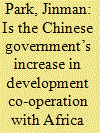

|
|
|
|
|
| Summary/Abstract |
Over the past few decades, the rapid growth of China’s development co-operation with Africa has attracted worldwide attention. Some people assert that development co-operation in Africa has contributed to the general development of the continent; however, others, many of whom are scholars and Western politicians, dispute its influence on Africa and are suspicious of its real motives, noting its exploitation of natural resources and increasing market encroachment. This study will discuss the expansion of China’s development co-operation with African countries from the perspective of Sinocentrism, as there appears to be an absence of a superordinate concept or ideology that extensively encompasses and interconnects the diverse explications from existing studies. Henceforth, this research aims to contribute towards examining whether Sinocentrism could be a possible superordinate concept of existing studies. As such, it could be helpful in better understanding Chinese development co-operation in Africa, by examining China’s history and its recent path in Africa as well as its international relations.
|
|
|
|
|
|
|
|
|
|
|
|
|
|
|
|
| 16 |
ID:
119740
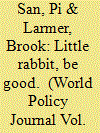

|
|
|
| 17 |
ID:
139158
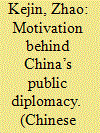

|
|
|
|
|
| Summary/Abstract |
Since 2003, the Chinese government has launched a succession of public diplomacy campaigns and programmes, the dynamics, potentials and implications of which have drawn growing scrutiny from Chinese scholars and government officials. Based on document reviews and interviews with Chinese scholars, officials, and think tanks, however, this article finds that the focus of the existing literature is on the image China wishes to project to the outside world, and that there is still little consensus on the strategic motivations behind the country’s conduct of public diplomacy. In its conclusion, the article expounds that garnering international respect for China’s political and social system and respect domestically for its political legitimacy is what the Chinese government really cares about. This being the case, China will not be satisfied to be merely an emerging power in light of its greater ambition to rejuvenate its values and political system.
|
|
|
|
|
|
|
|
|
|
|
|
|
|
|
|
| 18 |
ID:
137086
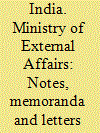

|
|
|
|
|
| Publication |
India, Ministry of External Affairs, 1954.
|
| Description |
97p.Hbk
|
| Series |
White Paper
|
| Contents |
B
White Paper No.I : 1954 - 1959
|
|
|
|
|
|
|
|
|
|
|
|
Copies: C:1/I:0,R:0,Q:0
Circulation
| Accession# | Call# | Current Location | Status | Policy | Location |
| A55816 | 327.54051/IND A55816 | Main | On Shelf | General | |
|
|
|
|
| 19 |
ID:
137084
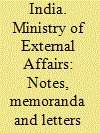

|
|
|
|
|
| Publication |
India, Ministry of External Affairs, 1959.
|
| Description |
v.2(ii, 132p.); v.3(ii, 148p.); v.4(ii, 103p.)Hbk
|
| Series |
White Paper
|
| Contents |
B
White paper No. II : September 1959 - November 1959
White paper No. III : November 1959 - March 1960
White paper No. IV : March 1960 - November 1960
|
|
|
|
|
|
|
|
|
|
|
|
Copies: C:1/I:0,R:1,Q:0
Circulation
| Accession# | Call# | Current Location | Status | Policy | Location |
| 055817 | 327.54051/IND 055817 | Main | On Shelf | Reference books | |
|
|
|
|
| 20 |
ID:
137082
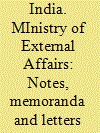

|
|
|
|
|
| Publication |
India, Ministry of External Affairs, 1960.
|
| Description |
v.5(iv, 161p.); v.6(vi, 281p.); v.7(v, 196p.); v.8(126p.)Hbk
|
| Series |
White Paper
|
| Contents |
B
White Paper No.V : November 1960 - November 1961
White Paper No.V : November 1961 - July 1962
White Paper No.V : July 1962 - October 1962
White Paper No.V : October 1962 - January 1963
|
|
|
|
|
|
|
|
|
|
|
|
Copies: C:1/I:0,R:1,Q:0
Circulation
| Accession# | Call# | Current Location | Status | Policy | Location |
| 055818 | 327.54051/IND 055818 | Main | On Shelf | Reference books | |
|
|
|
|
|
|
|
|
|